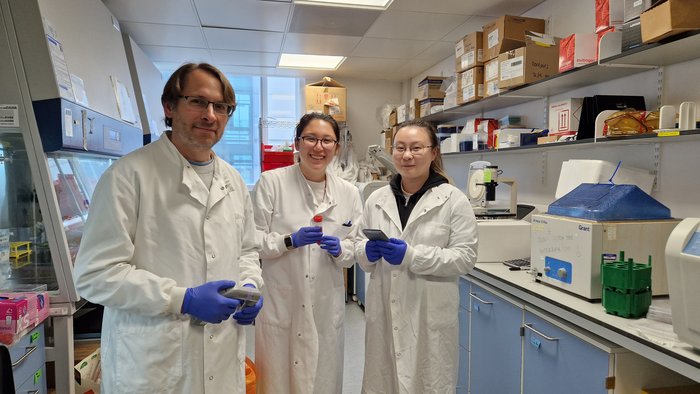Finding new ways to stop leukaemia and lymphoma growing
Both leukaemia and lymphoma can be caused mistakes in our DNA which can switch on ‘enhancers’ that cause the cancer cells to grow and divide. Dr Feldhahn is studying enhancers in more detail to understand which ones are helping blood cancers to grow.

Dr Dr Niklas Feldhahn and his team
The challenge
Leukaemia and lymphoma are types of blood cancer that affect white blood cells, the cells that help our body fight infection. Both leukaemia and lymphoma can be caused mistakes in our DNA. Our DNA is made up of genes which are like tiny instruction manuals telling the cells how to make proteins, which affect how the cell grows, develops and functions. One way we can control genes is through parts of our DNA called ‘enhancers’. These enhancers turn up certain genes, making more of that protein. This is a process that is carefully controlled. When carefully controlled, cells stay healthy and behave as they should, but sometimes things can go wrong. It's this process that causes a healthy cell to turn cancerous. Enhancers work by attracting certain proteins that help turn genes on. Some cancer cells need this to survive and so blocking these enhancers could be a way to destroy the cancer cells. We don’t currently know which specific proteins a particular enhancer relies on, or which enhancers are most important for the cancer’s survival. If we can understand more about these enhancers, we could develop new treatments to target them.
The project
In this project, Dr Feldhahn and his team at UCL want to create new ways to study enhancers so they can understand which ones are helping blood cancers to grow. To do this they plan to develop three different tools. The first will allow them to completely remove an enhancer from leukaemia cells so they can see exactly what happens when it’s gone. The second will help them measure how important a particular enhancer is for the cancer’s survival. The third will reveal which proteins an enhancer depends on to do its job. Once these tools have been developed, Dr Feldhahn and his team will test them to see how powerful they are for finding weak spots in the cancer cells, which could be targeted by future treatments.
The future
If successful, the hope is that this research will help to develop new treatments that attack cancer cells while leaving healthy cells unharmed. Although this research focuses on leukaemia and lymphoma, researchers hope this could be used to help treat many other blood cancers in the future. Dr Feldhahn and his team plan to share their findings with other scientists so they can speed up research around the world, giving people with blood cancer a better chance of survival and a better quality of life.
Funding
This project is part of the innovative pilot grant round.
